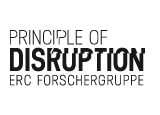
Time: 13./14.12.2013
Place: University Siegen
With participants from literary and media studies, law and the history of medicine, the workshop is designed to identify and analyse intellectual-historical constellations of disruption and the discursive frameworks that facilitate them. The discussions will be guided in the first place by problematizing the ways that caesura, irritation or noise are conceived and described in individual disciplines: for example, the communication models of language theory and mathematical information theory, cybernetics, ranging to the disciplines that use simulations for prognostic or action-theoretical purposes, the debates on the supposedly alien character of writing and the naturalness of speech, and lastly the discourse of “normalism” in the life sciences, which also deals with psycho-physiological disorders and establishes principles of inclusion and exclusion.
On this basis, the workshop examines the ways disruption has been approached historically and reflects on the ways a discursivisation of ruptures and caesuras is linked with debates in society: in the light of their dependence on phenomena of disruption, how should one conceptualise security apparatuses, the regulation of populations, states of emergency, prognosis, or communication in distributed networks? How is the formation of a society and its self-descriptions connected with disruption as a principle – is disruption perhaps the normal situation of cultural dynamics? An intellectual history of disruption could therefore address at least two key questions: first, how can disruption be conceived as a productive moment in the genealogy of various disciplines and in the formation of societies? Second, what knowledge of a society is unleashed when that society’s narratives – assuming the research group’s thesis is accurate – are guided by the processing of disruptions?
External Participants:
Cornelius Borck (Lübeck)
Ludwig Jäger (Aachen)
Susanne Krasmann (Hamburg)
Erhard Schüttpelz (Siegen)
Sebastian Vehlken (Lüneburg)
Joseph Vogl (Berlin)
Niels Werber (Siegen)